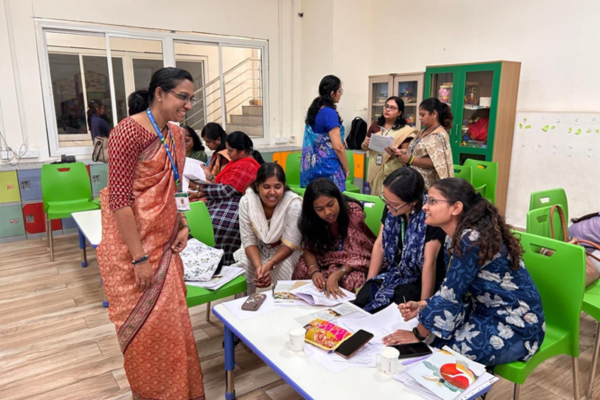As a parent, you want the best for your child's education. And as a school, we at PIS-Bachupally are committed to providing our students with a world-class education that prepares them for success in the modern world. One of the key ways we do this is by incorporating technology into the classroom.
Did you know that technology can enhance the learning experience for students in a variety of ways? From interactive games and simulations that make learning fun, to online tools and resources that help students explore complex topics in greater depth, technology has the power to engage and inspire students of all ages.
Technology has become an increasingly important part of education in recent years, and PIS-Bachupally is no exception. As a school that is committed to providing its students with a world-class education, we recognize the value of incorporating technology into the classroom.
Technology plays a crucial role in education by enhancing the learning experience for students, facilitating collaboration and communication, and making education more accessible and inclusive. At our school, we use technology to provide our students with a range of educational software and online resources, as well as online tools and platforms that enable them to work together and develop essential skills. This includes everything from online simulations and games that make learning fun, to interactive tools that help students explore complex topics in greater depth.
In addition to these benefits, technology can also help to make education more accessible and inclusive. For example, students with learning disabilities or other special needs can use assistive technology to overcome barriers and participate fully in the classroom.
At PIS-Bachupally, we are constantly working to incorporate the latest technology into our classrooms and programs. We believe that this not only helps our students to learn and grow but also prepares them for success in the increasingly digital world that they will face after graduation. Whether it is through the use of interactive whiteboards, online learning platforms, or other innovative technologies, we are committed to providing our students with the best possible education, and technology plays a crucial role in achieving this goal.
Visit our website to learn more about the role of technology in education at PIS-Bachupally, and see for yourself how we are using technology to enhance the learning experience for our students.
As parents, we all want the best for our children. We want to see them happy, successful and fulfilled in their lives. At PIS-Bachupally , we believe that every child has the potential to achieve greatness and we are dedicated to providing them with the education, support, and opportunities they need to reach their highest aspirations.
Are you tired of seeing your child held back by a lack of support or opportunities? Are you looking for a school that will help your child soar to new heights? Look no further than PIS-Bachupally.
At PIS-Bachupally , we offer a world-class education that is tailored to each child's unique needs and interests. Our experienced and dedicated faculty is committed to helping every student discover and pursue their passions, whether in the arts, sciences, sports, or any other field.
Our state-of-the-art facilities and extracurricular programs provide endless opportunities for children to explore, learn, and grow. From robotics and coding to music and dance, our students have access to various activities that will help them develop their skills and talents.
Don't let a lack of support limit your child's dreams and aspirations. Enroll them at PIS-Bachupally and give them the wings they need to soar to new heights. Contact us today to learn more and schedule a tour of our campus.
At PIS-Bachupally, we believe that every child has the potential to achieve greatness. We are committed to providing a world-class education and a supportive environment that will help your child reach their highest aspirations. Contact us today to learn more and give your child the wings they need to soar.
Developing good habits in children is crucial for their overall well-being and future success. Good habits not only help children in their academic and intellectual development but also in their physical and mental health. It is essential for parents and caregivers to encourage positive habits in children from an early age. In this article, we will discuss the top 10 good habits that children should develop.
Encourage children to engage in regular physical activity, such as playing sports or going for a walk. Exercise not only promotes physical health but also improves mental well-being.
Teach children the importance of a balanced diet and encourage them to eat a variety of fruits, vegetables, and whole grains.
Teach children the importance of good hygiene, such as regular handwashing, brushing their teeth, and taking showers.
Encourage children to read regularly, whether it be a book, a magazine, or a newspaper. Reading improves language and comprehension skills.
Time management: Teach children the importance of managing their time effectively by setting goals, making a schedule, and prioritising tasks.
Encourage children to develop a positive attitude towards life by praising their efforts and accomplishments and teaching them to be optimistic.
Teach children good manners such as saying please and thank you, using polite language, and showing respect to others.
Encourage children to develop self-discipline by setting boundaries and rules, and teaching them to be responsible for their actions.
Teach children to be grateful by encouraging them to say thank you, write thank-you notes, and express their appreciation for what they have.
Encourage children to help others by volunteering their time or donating money to a charity.
In conclusion, developing good habits in children is essential for their overall well-being and future success. Encourage children to engage in regular physical activity, eat a healthy diet, practise good hygiene, read regularly, manage their time effectively, have a positive attitude, possess good manners, have self-discipline, practice gratitude, and help others. By fostering these habits, children will be better equipped to handle the challenges that life throws their way and lead fulfilling lives.

I heard this story from a teacher. "It was a regular afternoon and I was working with a group of students when I noticed one child who seemed different from the rest. He was bright and full of energy, but he struggled to keep up with the tasks. It wasn't just that he was distracted—there was something deeper at play. His handwriting was unusually messy, he frequently misinterpreted instructions, and he seemed to withdraw during group activities.
I remember feeling unsure at first, wondering if I was reading too much into it. But as the days passed, I couldn't shake the feeling that something wasn't quite right. At that point, I decided to speak with a colleague who had experience working with children with differential needs. During our conversation, she mentioned the importance of using a checklist to spot the early signs of special needs, given by her school counsellor.
She suggested a simple yet effective approach: a checklist of behaviours and patterns that could help identify whether a child might need additional support.
That's when the idea hit me—why wasn't I using a checklist to observe and identify these signs sooner? The more I thought about it, the more I realized that having a clear, structured way to assess each child's needs could be incredibly valuable. It wasn't just about noticing the struggles; it was about recognizing the early signs so that the right support could be offered before things got too overwhelming for the child."
This story took me back to my early days joining as a school counsellor, when teachers approached me, struggling to address the needs of a few children, it sparked the realization of how important it is to empower them with the right tools to support their learners. Not just for a few, but for educators nationwide. This is where the idea of Prashast takes root.
PRASHAST stands for Pre-Assessment Holistic Screening Tool. It is divided into two parts:
PRASHAST covers all 21 disability conditions under the RPwD Act, 2016, including autism, specific learning disabilities, ADHD, speech and hearing impairments, and more.

The checklist is supported by an easy-to-use Android mobile application that allows schools to:
With everything digitized, educators can track flagged students and support them through structured referrals, which may eventually help them avail CBSE board exam concessions such as scribes, extra time, subject exemptions, and use of assistive devices—when backed by official certification.

As part of our broader commitment to inclusive education, the Delhi Public and Pallavi Group of Schools has actively rolled out training workshops on the PRASHAST checklist across multiple campuses.
A notable session was recently conducted at Pallavi International School, Bachupally, welcoming educators from several schools—including institutions beyond DPGOS. This was the first offline knowledge sharing session under the wellness hub and spoke model of CBSE. The training was facilitated by our expert team Ms. Triveni Varakala(CBSE Master Trainer), Ms. Sakunthala(Special Educator), Ms. Drishya(an expert from the field of neuroscience).
PRASHAST is not just a checklist—it's a mindset shift. It empowers educators to act early, act professionally, and act compassionately. For school leaders and teachers alike, this tool provides a clear, actionable path toward identifying and supporting every learner—especially those who might otherwise be overlooked.
Written by,

Triveni Varakala
School counsellor
Pallavi International
School, Bachupally